The best TV shows of 2021, from WandaVision to Midnight Mass
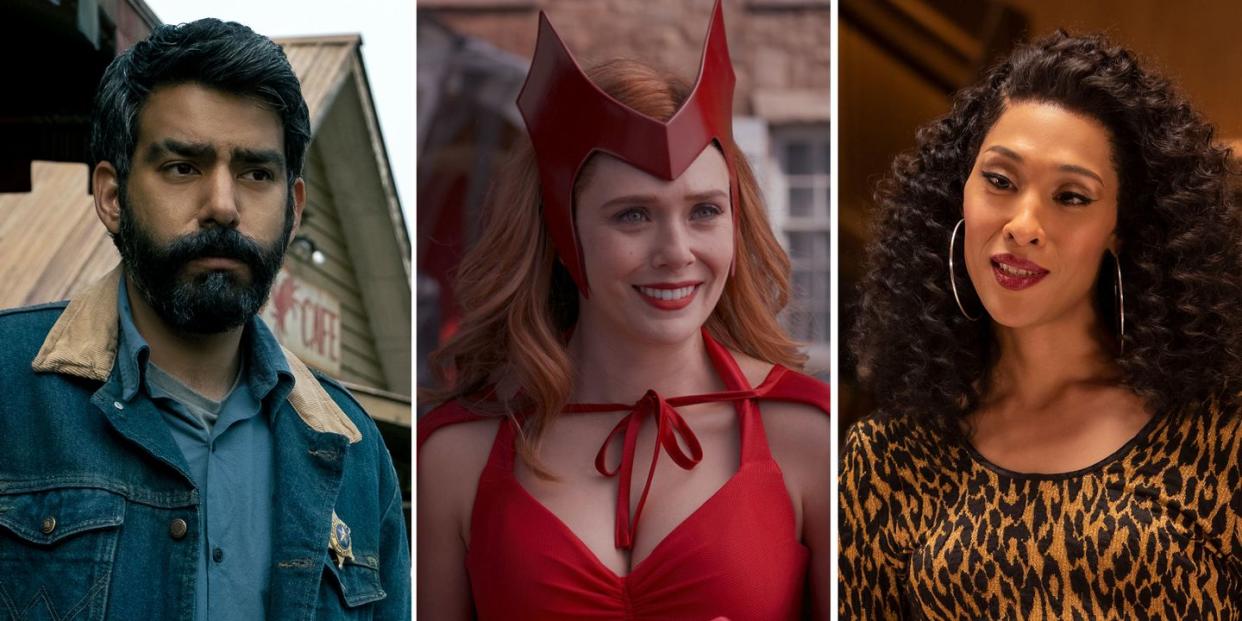
We live in unprecedented times, and not just because of You Know What. 2021 brought us countless TV shows and more streamers to watch them on than ever before. Because of this, you might assume that the quality has been diluted, that small-screen stories no longer resonate as much as they once did.
But thankfully, that couldn't be further from the truth. More TV means that more voices can be heard, which helps enrich our lives with new stories from all walks of life. We'd venture that TV has never been more exciting than it is right now, which made the task of choosing our own favourites a near-impossible one.
As beloved shows like Lucifer, Feel Good, and Kim's Convenience came to an end, new favourites arrived to take their place, including Reservation Dogs, The White Lotus, and The Underground Railroad. International shows like Squid Game and Money Heist stole our hearts like never before too, and then of course there's homegrown fare such as Time, Help, and Sex Education, which returned for another semester of addictive, horny fun.
Any of these shows could have easily won a spot here, and rightly so, but to celebrate all of this year's incredible TV, we didn't want to just rattle off another list of 2021's best shows – you can wait for the results of the Reader Awards for that! Instead, Digital Spy's TV team has hand-picked the shows that resonated with them most, the stories that helped get us through 2021. So without further ado, here are our personal faves of the year in no particular order.
WandaVision
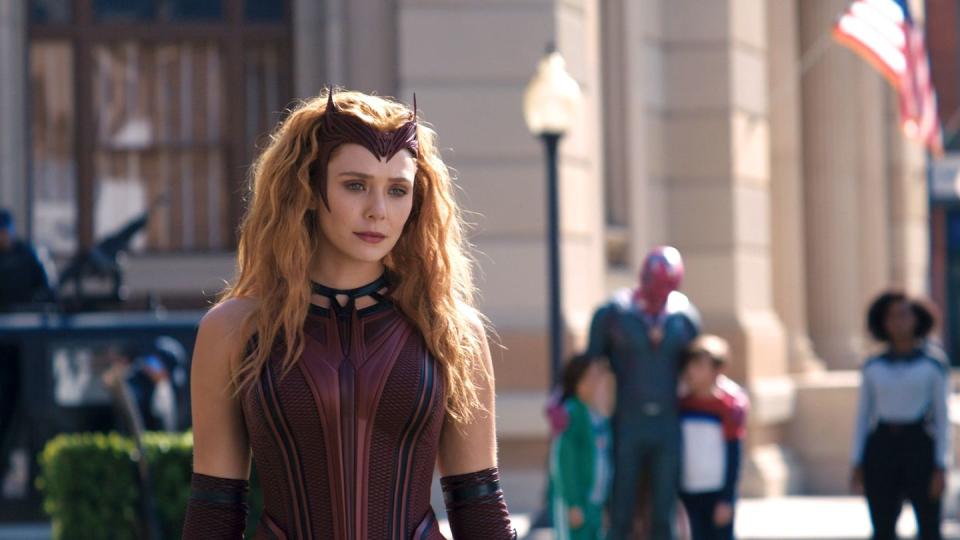
By David Opie, Acting TV Editor
Marvel really needed WandaVision. After the Avengers hit their actual Endgame, the future of the MCU was looking uncertain, even for a studio this successful and established.
But that's what made WandaVision so exciting. Once the rules were established, they were there to be broken, and it was only fitting that Wanda herself, the living embodiment of chaos magic, would be the architect of this.
Much has been made of the show's sitcom format, as well as the grief that perseveres underneath all that camp gloss, but not enough has been said about the timing of the show's release. Back in the early days of this year, a national lockdown quite literally drained the colour out of our lives, so it was weirdly cathartic to see Wanda, a queer fan-favourite, push back against her own monochromatic world on screen.
Between Drag Race UK on Thursday nights and WandaVision's weekly episodes on Friday mornings, gays everywhere (me, I'm gays) found some much needed escapism at a time when it felt like the world itself had hit an "Endgame" of sorts too.
RuPaul’s Drag Race UK season 2

By Tilly Pearce, Acting Deputy TV Editor
It’s never difficult to enjoy a season of RuPaul’s Drag Race, but there was some magic in UK season two that truly revived my love of the franchise as a whole.
First and foremost, the cast was impeccable, and truly showed the wide spectrum of British drag. Sure, the references at points may have gone over American judges’ heads (justice for Ginny Lemon) but it just made us love them more.
Then there’s the iconic moments that will go down in herstory as some of the all-time greatest scenes the show has ever brought about – whether it be the ever-resounding ‘bing bang bong’ in our ears from UK Hun? or an irate RuPaul screaming at Joe Black: "I don’t wanna see any more f**king H&M." Even mannequin Mick from 'Beastenders' becoming a judge due to "time constraints" is the kind of camp no other show could get away with.
Throw in the fact that coronavirus threw the production into chaos, Drag Race UK season two is the only series to come in two distinct halves. Before and after coronavirus.
In fact, while other shows tried their best to patch up the missing months they were unable to film, Drag Race just fully leaned in, with most of the cast using it to get some work done. But in continuing the series, it showed the true resilience not only of everyone wading through 2020 the best they can, but what it takes to be a drag queen and make things work, even with the odds stacked against them.
The queens, for all their shade, genuinely seemed to like and support each other, and through this they touched upon some lesser-known sides to life as a member of the queer community, including coming out as non-binary, or growing up as a gypsy.
While a third series is already up and out, there was something about Drag Race UK season two that set the bar for girls going forward – and set it very, very high.
Only Murders In The Building season 1
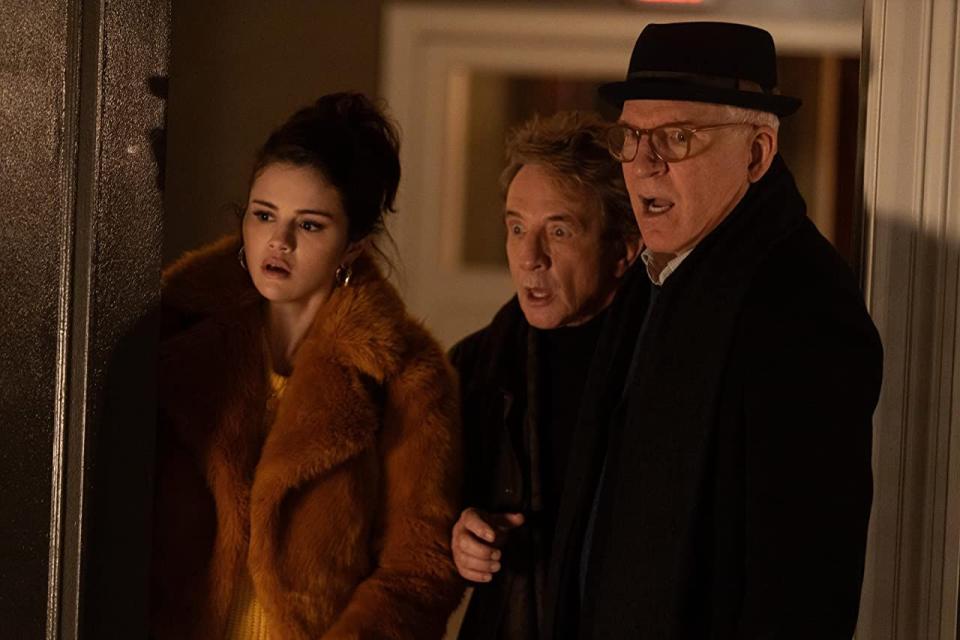
By Jo Berry, TV Writer
Steve Martin is a comedy genius – just look up ‘The Great Flydini’ on YouTube if you don’t believe me – but it’s his co-star Martin Short who delivered the most snort-inducing moments for me in this brilliant new comedy series.
Created by Martin, John Hoffman (Grace and Frankie) and Dan Fogelman (This Is Us), the series follows three strangers who live in the same Upper West Side Manhattan apartment building. And they all have one thing in common — a love of true-crime podcasts.
Charles (Martin), an actor who once starred in a hit cop show, Oliver (Short), a failed Broadway producer, and the mysterious Mabel (Selena Gomez) are thrown together when a murder happens in their building, and together they decide to investigate and launch their own podcast.
Martin, Short and Gomez make a superb triple act, delivering some of the funniest dialogue you’ll hear in ages, and the show also has hilarious supporting performances from Tina Fey, Nathan Lane and murder suspect Sting, who is funnier playing himself than I could ever have hoped for ("Rock icon Sting is a dog-poisoning murderer," Oliver declares at one point. "He’s like the next OJ. A hot, Buddhist OJ.")
But Only Murders In The Building belongs to Short, who is having something of a renaissance of late with his memorably sleazy turn in The Morning Show, not to mention his acclaimed comedy stage tour with Steve Martin.
His character Oliver’s explanation of how his musical theatre production of Splash flopped (the first musical to have a swimming pool on stage, complete with diving cast members) is so funny I genuinely had to pause it to wipe tears of laughter away. Thankfully, a second season is in the works, and I personally can’t wait to be back inside the Arconia apartment building once more in 2022.
It's A Sin
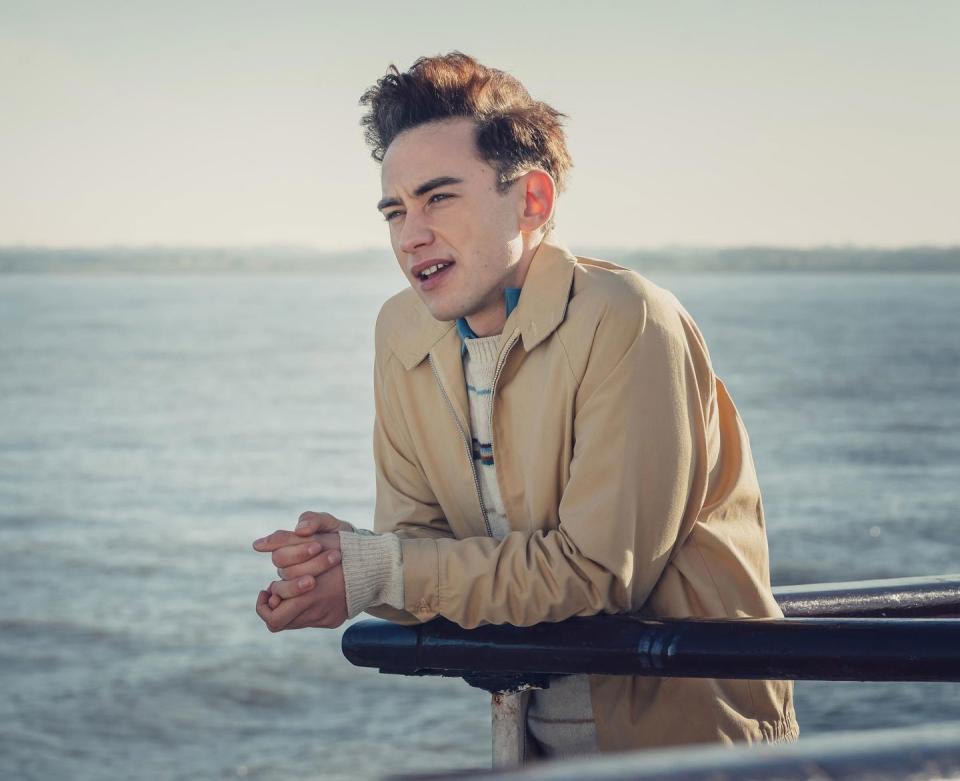
By David Opie, Acting TV Editor
I watched It's A Sin a few weeks before it was released on Channel 4, so I wasn't fully prepared for how devastating it would be. And not just because of its heart-wrenching story, or even the fact that so many gay men like Colin and Ritchie died in real life. We still don't talk enough about that entire generation we lost to fear and ignorance.
But no, the main reason I found it so hard to watch It's A Sin was because of how it forced me to confront my own shame (which I wrote about here), including some I didn't even realise I still felt as an adult, even now.
I was born in the mid-'80s, so I missed the worst of the AIDS crisis, but the homophobia that the media fuelled around it could still be felt ten years on. Before I even understood what queerness was, I knew believed that it was "wrong," something "disgusting" and "sinful" that should be shrouded in shame.
But It's A Sin, like Pose and Queer As Folk before it, flips that round entirely. Despite — or perhaps because of — its focus on death, the key take away from Ritchie's story is the euphoria of queerness, of a life lived with truth and love.
Growing up in a world where innate parts of yourself are openly mocked and condemned can really take a toll on a person. I don't know if that's something I'll ever fully come to terms with, not 100% at least, but watching something vital and queer like It's A Sin on terrestrial TV, with my husband no less, was a transformative experience, one that younger me would have never thought possible.
Midnight Mass
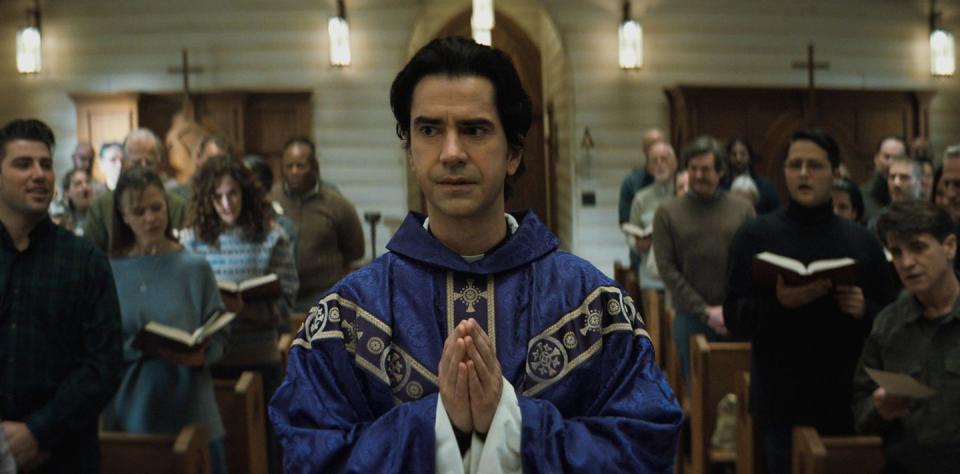
By Tilly Pearce, Acting Deputy TV Editor
Mike Flanagan cemented his reputation as a horror icon with Midnight Mass, with an incredible portrayal of religious hysteria, mob mentality and what happens when people are so convinced they are right, they can’t ever be proven wrong.
Set on a remote island, Midnight Mass sees the return of the religious fishing town’s black sheep, still in recovery after leaving prison for the hit-and-run, drink-driving death of a young woman. Haunted by his mistake, he finds himself bonding with the new priest of the town, who arrived after the long-standing vicar is taken ill during a trip.
Just when you think you have a grip on where the show is going, Midnight Mass completely throws you for a loop, leaving you questioning what the hell is going on.
It’s a slow burn, granted, but once you’re in the thick of it, it proved to be one of those shows that sticks with you, leaving questions to play on your mind well beyond the final credits. It’s one you can’t say too much about without giving away spoilers. But when I think of standout 2021 TV, Midnight Mass is definitely on top of the list.
Brassic season 3

By Jo Berry, TV Writer
On the surface, Sky TV’s Brassic is a fast and funny comedy drama about a group of working-class friends who do whatever it takes to get by (which usually means something mildly illegal) in their fictional town of Hawley.
Featuring the kind of mates I grew up around – though none of the guys I know ever tried to steal bull semen as they do in the show, at least as far as I’m aware – Brassic has friendship at its heart, and what makes the show special for me is just how big a heart that is.
Created by screenwriter Danny Brocklehurst (Shameless) and actor Joe Gilgun (This Is England), Brassic stars Gilgun as Vinnie, the sort-of leader of a group of pals that also includes Cardi (short for 'cardiac arrest' because he eats so much) and Tommo (who runs a secret S&M club).
Gilgun has stated that Vinnie is based on himself, and both the actor and his character have bipolar disorder. It’s rare for this condition to be depicted positively or even realistically on screen, but Gilgun’s honesty is in every frame (he has said in interviews that Vinnie is even on the same medication he is) and his performance is authentic, while also being loveable yet unsentimental at the same time.
While Vinnie’s life and experiences sometimes bring a little sadness or drama to the proceedings, especially in his relationships with his absent mother, and with friend Erin (Michelle Keegan), what makes Brassic work is that it also delivers laughs again, and again, and again.
Led by Gilgun, all the cast are just superb, but if you need one reason to check Brassic out, I must mention Dominic West as Vinnie’s GP, who has an obsession with women’s knees. Forget Jimmy McNulty in The Wire – this is West’s best performance in my eyes.
Pose season 3
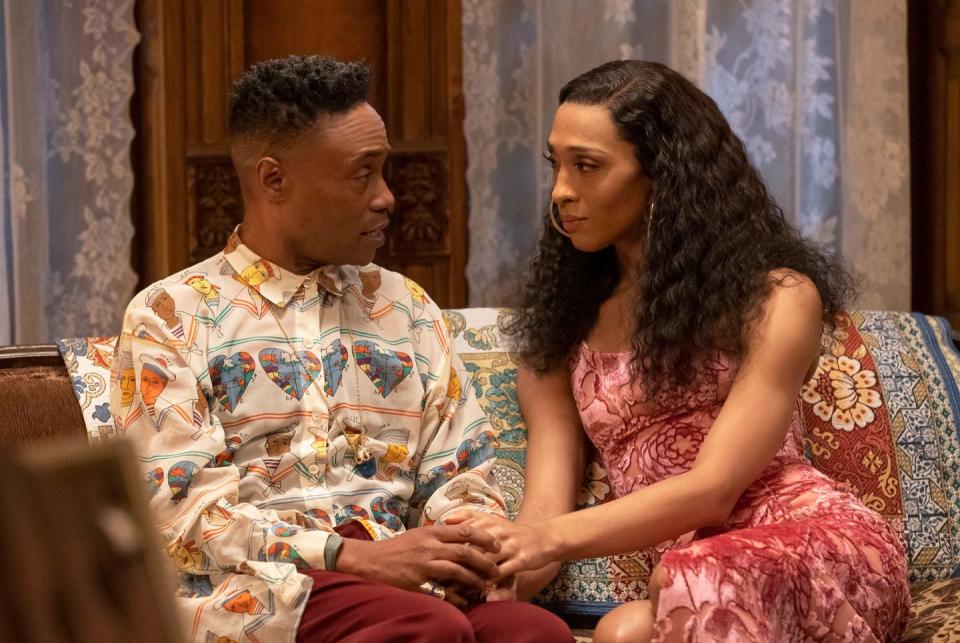
By David Opie, Acting TV Editor
Amidst all the transphobia that's perpetuated with cruel regularity in British media, trans people deserve to see themselves celebrated on screen, and crucially, there must be joy in this too, no matter how bad things get in real life.
Pose has always balanced the pain with this joy, but knowing that season three would be the last, the writers were finally able to go one step further and show everyone that the trans experience should not be instantly equated to misery or death. When Angel invites all of her friends to try on wedding dresses of their own, there's a new type of joy, not just a fleeting happiness in the moment, but one rich full of possibility, of a life worth living.
There's never been a show like Pose before, and now that it's come to an end, I worry that we may never see another one like it again. But that's not the message of this show. That's not how Blanca would want us to think.
Because this is a story of hope and resilience, of love and happiness, even in the face of overwhelming adversity. It might not happen straight away, but I'm certain that one day, there will be plenty more stories like this that centre the trans community — and in particular, trans women of colour — with such fierce pride and acceptance.
Too Hot To Handle season 2

By Tilly Pearce, Acting Deputy TV Editor
I love mess and chaos – and Too Hot To Handle season two was all that and more.
Sending a group of singletons over to Turks and Caicos on the promise of drinking, island hopping and bed hopping, Netflix’s dating series left the cast reeling when instead they’re slapped with a sex ban on arrival.
Cue the cast trying everything they can to bend the rules in an attempt not to lose the $100,000 prize fund that gets chipped into when they get hot and heavy.
In a year when Love Island well and truly failed us (sorry not sorry), Too Hot To Handle was there to be the dating show madness we needed in our lives across the summer. You try watching a Welsh boy convince his friends he needs to masturbate "for the good of the group", and actually succeed, without crying with laughter.
But as it happens, the show also brought about some true relationships. British stars Cameron and Emily, who boasted about their high sex drives before entering the show, remain together a year after filming.
There’s also some victory to be had in another cast member, Pete, getting his girl when filming wrapped, after failing to get her while in the villa.
We are so ready for the show’s return in January 2022.
Mare of Easttown

By Jo Berry, TV Writer
What starts off as a crime thriller – the investigation into the disappearance of a teenage girl in the Pennsylvania community of Easttown – turns into a revealing look at the life of forty-something divorced police detective Mare (Kate Winslet), which features one of the best female performances on screen – big or small – this year.
There are plenty of interesting actors who pop up as the story unfolds, from Evan Peters as cop Zabel and Julianne Nicholson as Mare’s friend Lori to the wonderful Jean Smart as grouchy Mare’s mother. But this series belongs to Winslet and – complete with spot-on Pennsylvanian accent – she is a tour de force throughout.
While some viewers understandably had issues with the investigation’s conclusion (which I won’t spoil here), it’s the personal story of Mare that keeps drawing you back in.
Grieving the loss of her son to suicide, taking desperate measures to keep custody of her grandson, tentatively dating author Richard (Guy Pearce), while also getting tangled up in a crime that involves friends and family, Mare is an everywoman who makes bad decisions and good ones, a woman who loves her family fiercely.
Winslet captures her beautifully, and to say that this is a career-best performance when you consider her roles in Revolutionary Road, Mildred Pierce and Ammonite, gives a hint at just how powerful to watch she is here.
You Might Also Like

 Yahoo News
Yahoo News 
